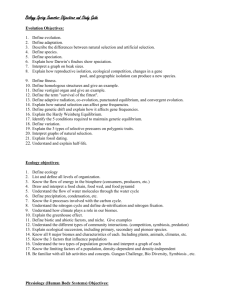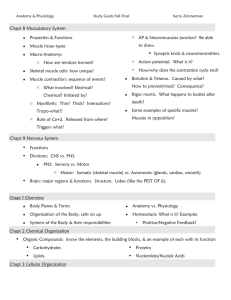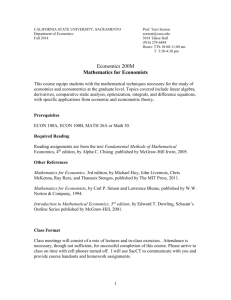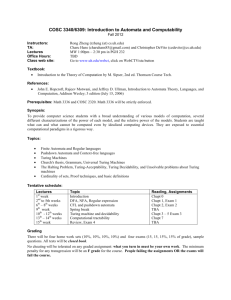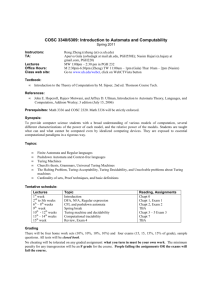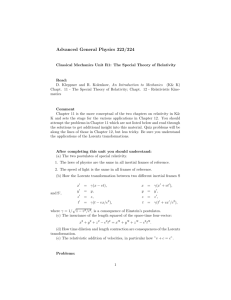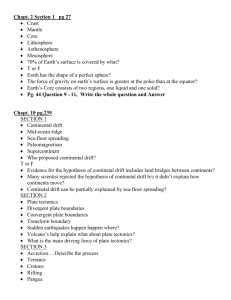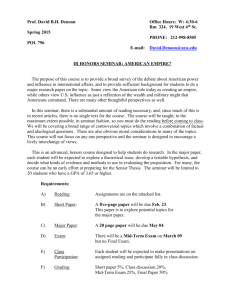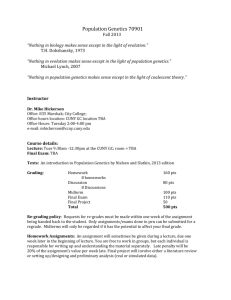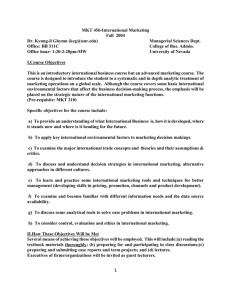The American Presidency - Illinois Wesleyan University
advertisement
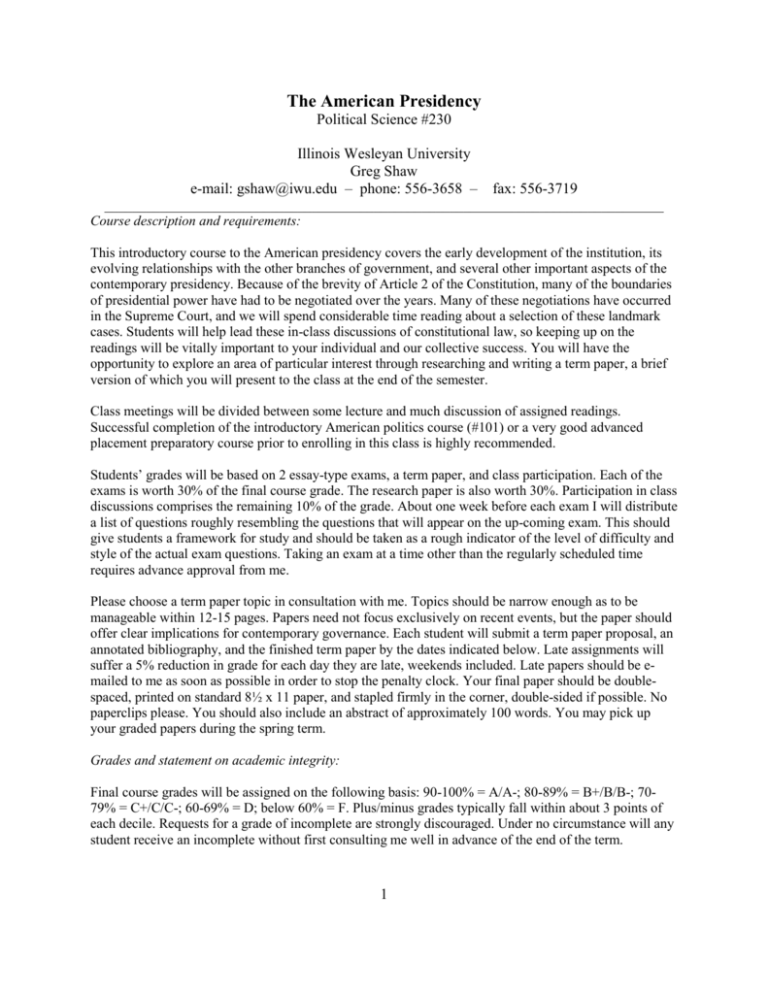
The American Presidency Political Science #230 Illinois Wesleyan University Greg Shaw e-mail: gshaw@iwu.edu – phone: 556-3658 – fax: 556-3719 _________________________________________________________________________________ Course description and requirements: This introductory course to the American presidency covers the early development of the institution, its evolving relationships with the other branches of government, and several other important aspects of the contemporary presidency. Because of the brevity of Article 2 of the Constitution, many of the boundaries of presidential power have had to be negotiated over the years. Many of these negotiations have occurred in the Supreme Court, and we will spend considerable time reading about a selection of these landmark cases. Students will help lead these in-class discussions of constitutional law, so keeping up on the readings will be vitally important to your individual and our collective success. You will have the opportunity to explore an area of particular interest through researching and writing a term paper, a brief version of which you will present to the class at the end of the semester. Class meetings will be divided between some lecture and much discussion of assigned readings. Successful completion of the introductory American politics course (#101) or a very good advanced placement preparatory course prior to enrolling in this class is highly recommended. Students’ grades will be based on 2 essay-type exams, a term paper, and class participation. Each of the exams is worth 30% of the final course grade. The research paper is also worth 30%. Participation in class discussions comprises the remaining 10% of the grade. About one week before each exam I will distribute a list of questions roughly resembling the questions that will appear on the up-coming exam. This should give students a framework for study and should be taken as a rough indicator of the level of difficulty and style of the actual exam questions. Taking an exam at a time other than the regularly scheduled time requires advance approval from me. Please choose a term paper topic in consultation with me. Topics should be narrow enough as to be manageable within 12-15 pages. Papers need not focus exclusively on recent events, but the paper should offer clear implications for contemporary governance. Each student will submit a term paper proposal, an annotated bibliography, and the finished term paper by the dates indicated below. Late assignments will suffer a 5% reduction in grade for each day they are late, weekends included. Late papers should be emailed to me as soon as possible in order to stop the penalty clock. Your final paper should be doublespaced, printed on standard 8½ x 11 paper, and stapled firmly in the corner, double-sided if possible. No paperclips please. You should also include an abstract of approximately 100 words. You may pick up your graded papers during the spring term. Grades and statement on academic integrity: Final course grades will be assigned on the following basis: 90-100% = A/A-; 80-89% = B+/B/B-; 7079% = C+/C/C-; 60-69% = D; below 60% = F. Plus/minus grades typically fall within about 3 points of each decile. Requests for a grade of incomplete are strongly discouraged. Under no circumstance will any student receive an incomplete without first consulting me well in advance of the end of the term. 1 I am aware that academic dishonesty has become common at some institutions. While I am sure that very few, if any, Illinois Wesleyan students would cheat on class assignments, the university’s policy and my policy on academic dishonesty bear repeating. Academic dishonesty fundamentally undermines the mission of the university and cheapens our collective enterprise. Students caught cheating on an exam or engaging in plagiarism on written assignments will receive a failing grade for the course. In these cases I will also file a formal complaint with the administration. The university’s academic dishonesty policy states that the administration will move to expel from the university any student who is the object of two such substantiated complaints. See the university catalog for further explanation. Readings: The following texts are required reading and are available at the university bookstore. The Presidency and the Political System, 9th edition, Michael Nelson, editor, Congressional Quarterly Press (2010) [referred to below as “Political System”] The American Presidency: An Analytical Approach, Irwin Morris, Cambridge Univ. Press, 2010 [referred to below as “Morris”] Presidential Power Stories, Christopher Schroeder and Curtis Bradley, editors, Foundation Press, 2009 [referred to below as “Stories”] Other readings are available on the library’s electronic reserve (password: president). They’re underlined below. _____________________________________________________________________________________ Week and Topic Readings ___________________________________________________________________________________ Course introduction Perspectives on the presidency Political System, chapter 2 Morris, chapts. 1 & 2 The creation of the presidency Some history and some early presidents Article II and the 12th amendment Political System chapt. 1 Stories, introduction Morris, chapt. 3 Some lessons on the presidency from the 19th century Prize Cases, Ex Parte Milligan Modern theories of presidential power Stories, chapts. 2 & 3 Morris, chapt. 4 Stories, chapt. 4 (In re: Neagle) Political System, chapts. 3 & 4 Research methods refresher: Tuesday & Thursday Asking useful questions Gathering good evidence Performing appropriate analyses Writing well organized and informative papers 2 The White House and the executive bureaucracy Bureaucratic control Executive branch nominations Exec. oversight and the unitary (?) executive Political System chapt. 12, 13 (skip pp. 386-394) Stories, chapt. 5 (Myers) Morris, chapt. 8 Stories, 11 (Morrison v. Olson) Term paper proposals due in class What’s your question? Why does it matter? Describe your evidence Congressional-executive relations Political System, chapt. 14 Morris, chapt. 6 Stories, chapt. 7 (steel seizure) Annotated bibliographies due in class: Thursday Congressional-executive relations Mid-term exam Stories, chapt. 9 (U.S. v. Nixon) Judicial-executive relations Morris, chapt. 7 Stories, chapts. 7 & 12 (Keith, Hamdan) Political System, chapt. 15 Presidential elections Morris, chapt. 5 Political System, chapts. 6 & 7 Read the document on the origins of the Electoral College found at: http://www.uselectionatlas.org/INFORMATION/INFORMATION/electcollege_history.php Foreign policy Morris, chapt. 9 Stories, chapt. 6 (Curtiss-Wright) The media & public opinion Political System chapt. 9 Murray and Howard, Public Opinion Quarterly, vol. 66 #4 (2002; available via J-STOR) War making and national security The presidency at war The vice-presidency (optional reading) Political System, chapt. 17 Political System, chapt. 18 3 Some final considerations Presidential greatness The psychological presidency Morris, chapt. 11 Political System, chapt. 5 Student presentations: Tuesday and Thursday Plan on a 10 minute presentation of your paper, plus a few minutes for Q&A Course evaluations Term papers due to my office Final exam 4
